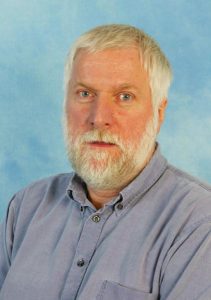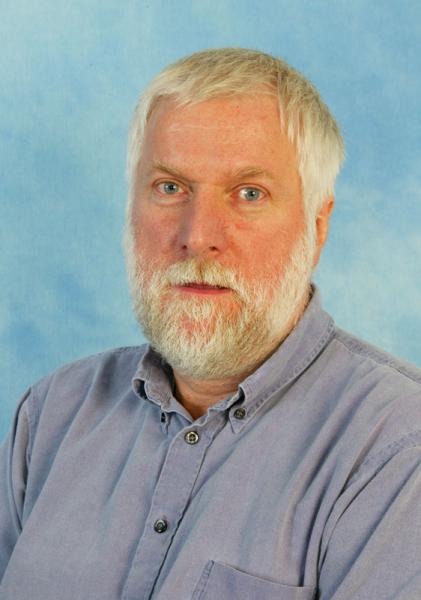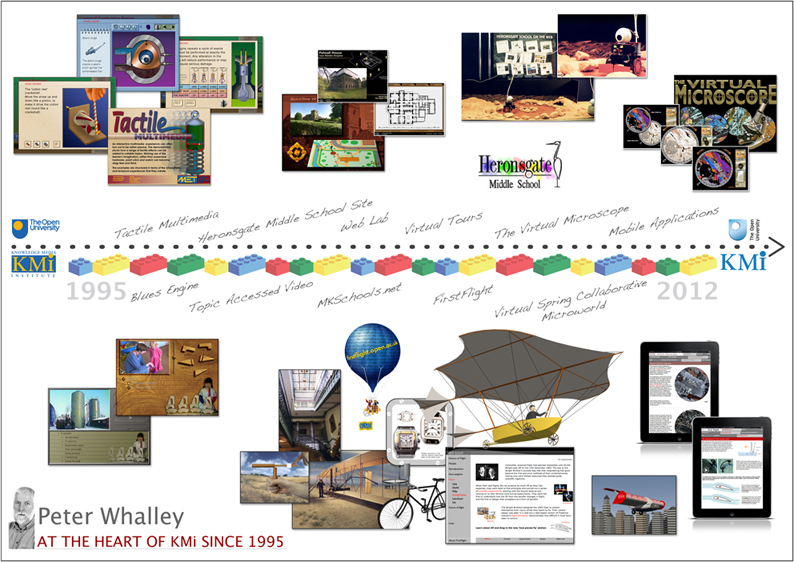News Story
Peter Whalley Tributes
Sunday 20 Jan 2013
It is with great sadness we pass on the news that Dr Peter Whalley, who recently retired from KMi due to ill-health, died on Tuesday 8 January 2013 in Willen Hospice.
Peter joined the OU in 1976, initially working in the Institute of Educational Technology. He joined the Knowledge Media Institute at its formation in 1995, where he was a ‘creative visionary’ in the new media team, and a stalwart of the lab. Peter brought numerous new ideas to his research and to students of the Open University. He was deeply engaged in applying his ideas within schools, including a longstanding collaboration with the innovative staff and children of our local middle school, Heronsgate, where many of his prototypes and experiments saw their first ‘student click’. Most recently, he was a strong evangelist and contributor to the OU’s flagship ‘virtual microscope’ work.
Our thoughts are with Peter’s wife, Liz, and their children Ben, Matthew and Jessie at this sad time. The funeral was held on Monday 21 January in Simpson Church, Milton Keynes. Tributes to add below can be emailed directly to kmi-director [at] open [dot] ac [dot] uk
Peter Scott
After returning from the DES in 1988, Peter was a great influence on my research and development of applications of IT in education and training – from the very start he continually inspired with great ideas that led to innovative projects that attracted funding from numerous sources. My first contact with Peter was when he walked into my office and made disapproving comments about the PC on my desk! Little did I know at the time how dedicated that he was to Apple’s technology. I was soon ‘converted’ and it proved in itself to be decision that I remain extremely grateful for as it opened up many new opportunities to widen my research. To this day I remember, as do many others, Peter’s Virtual Microscope. It would be an impressive development in this day and age with the powerful technology that is now used. However, it was truly pioneering in the early days of computer technology. At that time people were amazed to see a magnified image that could be rotated by 360o in polarised light – easy these days but not in early pioneering days. Peter worked closely with colleagues in the Earth Sciences Department and collaboratively on developing a Quicktime VR application to enable disabled students to participate in ‘field trips’ that were otherwise inaccessible. In 1992, Peter and I put together a successful application to the Department of Health to develop a multimedia, CD based system to provide access to information for disabled people. Peter’s Topic Access Video application, developed initially for a school project, subsequently provided a model, funded by the Gatsby Charitable Foundation, at the UK’s leading centre for providing training for professionals giving advice to disabled people about the choice of specialised equipment. Peter’s contribution to learning at Heronsgate School was outstanding and memorable. It was inspirational for children and teachers. Two applications that stand out are the Mars Buggy and First Flight (a simulation of the Wright brothers plane). When Lord David Puttnam visited the Heronsgate School he was amazed at the confidence of young children who talked to him about multimedia and film making. Overall, Peter made a major contribution to the application of multimedia in education and training. He leaves a tremendous legacy.
Tom Vincent
I first met Peter when he was working in IET on the nature of textual displays and readability, and recall his profound grasp of everything from the underlying psychological theories of perception right down to the electronic circuitry needed to conduct experiments and build prototypes. Peter exerted a powerful influence on the whole shape and tone of KMi from the very beginning in the mid-90’s. He had strong views, which typically turned out to be correct, about what was needed to build motivating tools for learners and what kinds of things we as researchers should be showing off to the world — more often than not it was the demonstrations of his projects that we chose to show to lab visitors, making him very much a key player in creating the ‘wow’ factor of KMi. He was way ahead of the curve in terms of understanding the potential impact of technogy on learners of all ages. Back when wireless technology was still new and unreliable, he approached me with the idea of beaming a high-speed internet signal from the rooftop of our building outwards to schools in the area, bouncing the signal via intermediate buildings if so required. His vision became a reality, and formed the core of what later became mkschools.net, through which dozens of schools in the area attained a high-speed internet connection many years before this capability was widely available. Peter was never infatuated with technology for its own sake: instead, he saw technology as a force to be harnessed and moulded by learners, especially young learners, to expand their minds through creative scientific experiments, designed and run by the learners themselves. His work thus directly influenced countless researchers, young and old alike, and his creative input and productive output will be sorely missed.
Marc Eisenstadt
Peter was a really good man, and I greatly respected his work, he was really enthusiastic and was a great role model to me as a new PhD student: I found his enthusiasm really wonderful and loved his office full of mad gadgets that he’d then take out to schools to enthuse others about science. This was somebody I could aspire to be. Deepest sympathies to his family, and all his friends in KMi and beyond.
Mark Gaved
Sad loss of a very innovative and exciting thinker and enthusiast.
Simon Kelley
This is such bad news! I will remember Peter every time I set my Lego robot going (it was designed and built by him and runs on one of my microscopes). He has been an inspiration to us all and will be greatly missed.
Andy Tindle
Peter was an enthusiastic innovator as a researcher on adults’ reading techniques in IET’s Textual Communications Research Group, which he joined from Brunel University. Later he worked on the Virtual Microscope, Topic Access Video, ImagineIT and many other projects with Tom Vincent.
David Hawkridge
We first met Peter in the Dark Ages (mid 80s) when computers were just appearing in Earth Sciences, provided they were PCs of some sort. Peter was a vital leader of the Mac group, "because we could all do so much more with a Mac (and probably you could use one too)". Peter ‘acquired’ a Mac (then like gold dust) for a very bright Earth Sciences research student who wanted to embed complex chemical analyses on a map. Peter just appeared with the machine one day: "that guy’s doing important work, he needs a Mac". Peter was a real enthusiast for all he did, his work was fun. He was the driving force behind the early Virtual Microscope; whatever was being implemented, Peter was always several steps ahead, pushing everyone on. Later, when a prototype V-M was sent to summer school for students who had difficulty with microscopes, it was typical Peter that he came to Reading to spend a week working with students: "I need to see students using it, not what you lot think they are doing". After many years working very closely with Andy Tindle and others in Earth Sciences: "I’ve been told I’m not allowed to spend any more time on the V-M, so…..(of course)… you’ll be seeing MORE of me in Earth Sciences, if that’s OK with you lot" Typical Peter, never one to take ‘management’ too seriously. It says a lot for the light touch of Tom & Marc that the V-M continued to flourish, with Peter fully involved. We’ll remember Peter for the sheer enthusiasm for a new thing, soft or hardware, he’d just discovered, like his remote drive Mars buggy, developed for use at his local school, but for a while its website was most frequently visited by NASA! The university needs adults like Peter who never lose their love of working with kids of all ages, developing educational toys.
Dave Williams, Dee Edwards (OU Earth Sciences, retired)


Latest News
PhD Awarded for Groundbreaking Research on Game-Based Cyber Security Training
KMi at the Palace of Westminster: Exploring Blockchain for Society and Economy
OUAnalyse at the Digital Ethics Summit 2025: Advancing Responsible AI in Education

